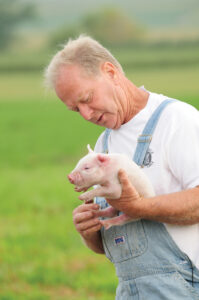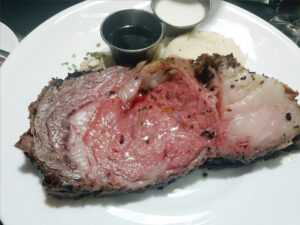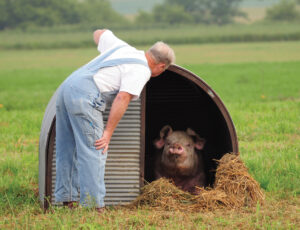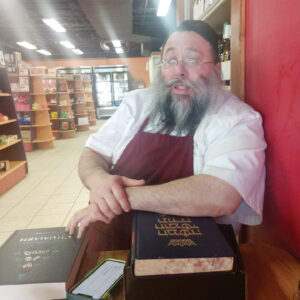The proud carnivore
2/2/2022A relative recently told me that her daughter returned home from college for Christmas break and announced she was a vegan. She demanded to take meals by herself because she could no longer eat around meats, fish, cheese or the people who ate them, especially her brother.
A good friend told me she was interested in a guy she met but saw no future in that because he was a vegan and she could not imagine life without the fleshly delights of meat and fish, eggs and cheese. That same friend had previously confessed that she broke up with a previous boyfriend because he would not let her eat off his plate.
Hearing that story, another friend said she broke off an engagement five years ago because her fiancé lectured her when he caught her using the elevator to carry groceries up to their fifth floor flat in New York City. “I just didn’t see how my trudging up five flights of stairs with my arms full was going to save the planet,” she explained, adding that the ex-fiancé never did any shopping because that was woman’s work.

Paul Willis, a Thornton, Iowa, pig farmer, who founded Niman Pork, says, “Our pigs only have one bad day in their lives.”
What’s going on? The years of this writer’s long life have become increasingly more polarizing and self-righteous. But, normally, intolerance of others’ beliefs and behaviors has been about politics, religion and war. Now it’s about food?
After his famous “Can’t we all get along?” question in 1992, Rodney King added something that is hardly ever quoted. “I mean, we’re all stuck here for a while. Let’s try to work it out.” There are always going to be people who try to shame others for things as inconsequential to them as other people’s diet choices. But nearly eight billion of us are stuck here together for a while with so little food that 20% of the planet’s children are malnourished. Is there really time to shame others about what they eat, or farm?
That is particularly true today in a nation where pundits like Judith Butler proclaim that the body mass index was created to shame non-white people, that doorway and airplane designs are racist, and that all jokes legitimize hate. I am glad my longtime partner, comedian and food writer Shirley Fong-Torres didn’t live to hear that last judgment. She used to run tours of San Francisco where she told visitors that “In Chinese, ‘vegan’ translates as ‘lousy hunter.’ ” Her 6-year-old granddaughter explained to her 4-year-old sister once that their similarly aged cousin was a vegan. “Poor Coco,” replied the younger sister, “she doesn’t know what she’s missing.”
PC critics save a special place in body mass hell for anyone they can label as fat phobic, even as obesity rates grow in revelational synchronicity with diabetes and cardiovascular problems. Novelist Larry McMurtry wrote that “medicine is the softest of all sciences and nutrition is the melted margarine of medical science.” Obesity rates began growing even as cholesterol consumption began falling. Many medical writers now believe that high fructose corn syrup is considerably more dangerous to heart health than cholesterol. Almost all now agree that the trans fats of margarine are far worse than the cholesterol one consumes in butter. High-meat diets like the Paleo help people keep the weight off more successfully than the high-carb diets like the Atkins.
Rochelle Gillman, dietician for the Iowa Beef Industry Council, believes the red meat she touts is one of the healthiest foods on earth.
“There are recent studies that show the Mediterranean Diet includes as much beef as most Americans consume — 3 ounces and 170 calories per serving. Europeans combine it with more fruits and vegetables, though. Beef is great for the human immune system with large amounts of zinc and 10 other main nutrients. The American Plains are covered in grasses that only cows can convert into something that is highly edible and incredibly nutritious.”
Another frequent argument by vegan shamers of carnivores is that meat is inhumane. As CITYVIEW has been writing for more than 25 years, that’s changing. In Iowa, organic dairies, like many around Kalona and Fairfield, raise dairy cattle on a cow-friendly diet, more so than most all of the large “organic” dairies in the American west. All Niman Ranch pork is raised humanely with free-range access. Their pigs are happy as puppies when one visits them. Paul Willis, a Thornton, Iowa, pig farmer who founded Niman Pork, likes to say that “Our pigs only have one bad day in their lives.”
Iowa Pork Producers communications director Dal Grooms points out that pork has other good things going for it, like localness and economic enhancements.
“Pork checks lots of the boxes: tastes good; a versatile meat to cook with; is not only protein-packed but has lots of other great nutrients; has cuts that get the nod from the American Heart Association; and it’s easy to prepare. And, if you are a savvy shopper, you can put a great product on your family table at a relatively low cost.
“In Iowa, pork is one meat that is absolutely local. We have pig farmers all over the state and many processing plants and local butchers who know how to give you many options for fresh pork, whether that’s quick and versatile ground pork, or a more elegant crown roast. You aren’t going to have a charcuterie board that gets oohs and ahs if you don’t have prosciutto, salami, mortadella, and a bit of bacon jam on it.
“And pork is real meat from real farmers. It’s not a designer food. It’s not processed in a petri dish. And it doesn’t pretend to be a vegetable. Iowa’s pig farmers recognize that consumers want choice, so if you want to enjoy a meatless day here and there, go ahead. The point is having choice and variety, and that’s what Iowa pork producers have been offering consumers for more than 150 years.”

Aged prime beef, like this cut of prime rib at AJ’s, is Iowa’s culinary gift to the nation.
What’s morality got to do with it?
Jonathan Haidt’s book “The Righteous Mind” gets into food choices more than most other books about morality, at least outside of India. Haidt believes that John Stuart Mill set the standard for morality’s limits. Namely, that the only justification for interfering with the personal choices of individuals is the prevention of harm to others. Haidt also does research that shows that moral choices about what is good and bad are as much influenced by personal feelings as by rational thought.
Haidt studies food taboos around the world to find their commonalities and differences. He writes that the Hua of New Guinea have an elaborate system of taboos on what men and women can eat. Boys cannot become men without avoiding any “foods that remind one of the vagina — anything red, wet, slimy, that has a hole or hair.” Haidt argues that the Hua do not consider these things social conventions but essences of morality, the difference between right and wrong.
Haidt also points out that morality is quite different in America and India. Americans consider the beating of dogs immoral, Indians not so much. Indians think it is sinful for widows to eat fish, for women to cook without bathing first, or to eat with men for whom they cook. Americans do not.
In another wide-ranged study, he asks control groups from a myriad of places if it is OK for a brother and sister to have sex, just one time, to make their relationship stronger for their secret, and also if it is OK for a vegan lab tech to take home an incinerated human cadaver for meat, so as not to waste food. Thirteen percent thought the cadaver-eating vegan was morally justified, and 20% thought there was nothing wrong with the incestuous siblings.
One final story about food taboos that Haidt tells is a true tale of a German lab tech who advertised in 2001 for a young man who wanted to be used as food. The latter signed on and consented in writing before the technician cut off his penis and cooked it. The two then shared that last meal before the suicide/sacrifice bled out. He was butchered and eaten during the next year. The tech was only charged with manslaughter and is now free again. That story appalled more subjects than any other.

All Niman Ranch pork is raised humanely with free-range access.
The ultimate lab of food taboos
My biggest sense of food shame happened during a year of researching diets and taboos in India. Most cab drivers there hung an image of their favorite god from their rearview mirror. I rode with one who showed off Indira Gandhi, then the Prime Minister. “Why do you love Indira-ji?” I asked. “Before Indira-ji, we never had onions. Now we eat them every day,” he replied. It was humbling to realize I took onions for granted.
India is the world’s great food lab. It was the planet’s melting pot long before America called itself that. Central Asians, Chinese, Persians, Portuguese, Dutch, English and French conquests all brought food diversity and intolerance. So did the different religious practitioners — Sikhs, Jains, Buddhists, Christians, Jews, Muslims, Zoroastrians, Hindus and Buddhists.
Lizzie Collingham, who spent a lifetime researching food and history in India, writes in “Curry: A Tale of Cooks and Conquerors” that, in India, “Christians will eat virtually any meat or fish. Muslims will eat most meats including beef but avoid pork. Jains are usually strict vegetarians and even avoid red foods because they are the color of blood. Hindus avoid eating the meat of the sacred cow.”
She goes on to note many exceptions, or hypocrisies, to the judgmental. Many Brahmins, the most self-righteous sect of Hindus regarding diets, will enjoy beef broth when feeling ill. Brahmins in Kashmir gladly eat mutton but never onions or garlic. Brahmins in Bengal eat fish.
India’s strict dietary dogma began with the great texts of Ayurveda (science of life) written in the century before the birth of Christ. Ayurvedic restaurants still exist in India and even in Fairfield, Iowa. To keep the body in equilibrium with its environment, people in marshy climates are told to eat iguana and those in the plains should eat the black antelope. In hot months, the body should consume cool, milky gruels, and in cold months, fatty meats.
The texts of Ayurveda created six rasas (tastes) that correspond with the six flavors of modern cuisines from Thai to Californian. They also defined what is pakka (pure) and what is kakka (polluted), which still very much influence the higher dictates of Indian food taboos. Pakka foods are prepared in products of the holy cow — ghee, cream, yoghurt, lassi, milk and cheese. They are eaten by upper caste Hindus. Kakka foods are prepared in water that can easily transfer impurities into foods, like rice and lentils, by making them porous. They are the foods of the lower castes. (“Pakka” is slang in India for anything one likes, like “cool” is in America.)
The flesh of the cow was not forbidden through the time of the Ayurveda treatises. All red meat was beloved by warriors in the ancient Sanskrit epics. Collingham suggests that changed when India became more agrarian and cows were more prized as draft animals than as meat.
She also discusses the most successful vegetarian campaign in history to shame carnivores. The first two emperors after the Mughal conquest of much of India in 1526 were so nostalgic for the foods of their native Central Asia that they loved hunting and roasting meats. But Akbar the Great, the third Mughal emperor, came under the influence of the Hindu holy men and turned vegetarian in belief it was shameful to slaughter animals for food.
The Mughals were tolerant about what their subjects chose to eat. That was essential in a land overwhelming in geographical and agricultural diversity. Those were the days.

Rabbi Yossi Jacobson, owner of Maccabee Deli, says he has a Yiddish name for vegans — schmendrick.
The kosher guru
Rabbi Yossi Jacobson owns the glatt Maccabee Deli. Glatt is the strictest form of kosher and is rarely found west of New York City. He also has championed the creation of a center in Des Moines for bringing together all the tribes of world religions for culinary and cultural sharing and understanding. (That project has not found funding for decades now.) No one is better qualified to talk about diets and diet shamers than he is.
“Sometimes customers ask me why we only have beef here. Deer is kosher, but it isn’t tender. Lamb is kosher, but it’s too expensive. We won’t serve fish and meat together because fish bones can choke you. You won’t see fish on a kosher menu unless it has been requested, for that reason. The hindquarter of a cow is not kosher because when Jacob wrestled God, as an angel of God, he was struck in the hip. Then God changed Jacob’s name to Israel. Today so many Jews are so involved fighting anti-Semitism that they forget what it means to be a Semite,” he explained of kosher dogma.
What does the Rabbi think about vegans?
“They are difficult. We have invited vegans to dinner, and they never tell us they are vegan until dinner is served. Then they throw up their arms in horror and say they can’t eat that, they are vegans. I have a Yiddish name for vegans — schmendrick. They want to stand out and receive special attention. They would rather make you leave the dinner table and go search your kitchen for something they will eat than to tell you up front they are vegan.
“Vegetarians are not difficult like that. They always let you know what they will eat and what they won’t. Our only vegan dish at the deli is falafel, but we don’t advertise that. Some of our customers try to eat vegan to feel better, but usually only occasionally. One of them came in after his vegan period and ordered a different part of beef every day. Many Jewish former vegans are ordered by their doctors to eat meat. We do provide exclusively vegan products — the meat we serve in a kosher deli is all vegan. We will never serve any meat that eats its prey,” he said with a rabbinical smile.
The final word on the moral superiority of the carnivore diet goes to Rochelle Gillman. “People love to eat meat. It makes them happy and healthy. Happy healthy people are good for the world.” ♦




















